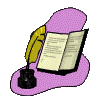|
|
The
WebQuest Page This site has links to all the best about WebQuests, including webquest design instructions, teacher and student webquest templates that can be copied and edited, and links to lists of already constructed webquests for K~12 |
|
|
Filamentality "Filamentality is a fill-in-the-blank interactive Web site that guides you through picking a topic, searching the Web, gathering good Internet sites, and turning Web resources into learning activities. It helps combine the "filaments" of the Web with a learner's "mentality". Support is built-in through Mentality Tips that guide you along the way to creating a Web-based activity you can share with others even if you don't know anything about HTML, Web servers, or all that www-dot stuff." This site guides you through the complete instructional design process, from picking a topic to building and actually posting a hotlist, scrapbook, treasure hunt, subject sampler, or WebQuest. A really helpful and easy to use site! Spend some time here. |
|
|
Webquest
Training |
|
|
WebQuest
Template
|
|
|
Teaching
with WebQuests: An OnLine Course
"In this course, you will create a web-based lesson that engages your students in higher order thinking and cooperative learning. The WebQuest model that you will learn will be applicable to a wide range of topics, goals, classroom environments and learners. As you progress, you will learn how to develop attractive web pages, locate useful information on the Web, work collaboratively with other teachers at remote sites, and evaluate complex achievement by your students. You will also learn about teaching for understanding, and develop a set of teaching and assessment strategies you can use with or without the Internet." |
|
|
WebQuest
Class
Two companion sites from Olivet Nazarene University and Aurora University:
|
|
|
WebQuests and Scaffolding
|
|
|
Building Blocks of WebQuest Design
"Putting a WebQuest together is not much different from creating any kind of lesson. It requires getting your learners oriented, giving them an interesting and doable task, giving them the resources they need and guidance to complete the task, telling them how they'll be evaluated, and then summarizing and extending the lesson. You can think of each of these parts as a separate building block, By changing each of the blocks, you can use this structure to accomplish a wide range of learning goals." |
|
|
WebQuest
Workshop Links are provided to resources for reviewing webquest examples, searching for online resources, using WebQuest templates |
|
|
Why
WebQuests |
|
|
Design
FlowChart |
|
|
WebQuest
Evolution
|
|
|
Instructional
Templates
|
|
|
WebQuest
Taskonomy: A Taxonomy of Tasts
"The
task is the single most important part of a WebQuest. It provides
a goal and focus for student energies and it makes concrete the
curricular intentions of the designer. A well designed task is doable
and engaging, and elicits thinking in learners that goes beyond
rote comprehension. |
|
|
Steps
in Building a Unit of Study
|
|
|
American
Memory Collection at the Library of Congress This site takes
you to the American Memory page at the Library of Congress. There
are prepared lessons, links, and resources for teachers in American
History at all grade levels The lessons use the historical collections
at the National Digital Library.
This site deserves your attention! |
